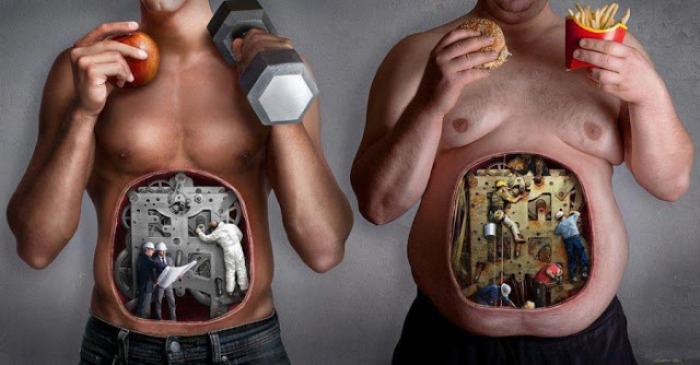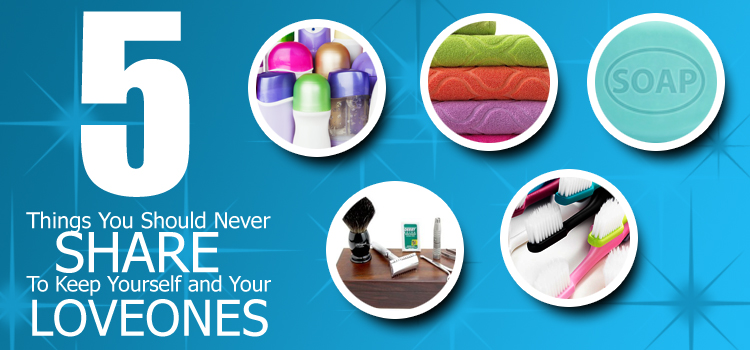Sharing is caring – that is something that’s been taught to us from a time when we were young. But there are times when sharing do not end as caring. There are instances when sharing might actually do more harm than good.
Here we bring you things you should never share to keep yourself and your loved ones well:
Razors, Nail Trimmers and Cutters
These things can cut, and when there’s a cut there’s blood – and blood no matter how many vampire movies you watch is harmful and can transmit diseases. Take in for example the recent news when HIV is supposedly passed through the use of infected cuticle scissor.
Also, razors can spread infections such as folliculitis, jock itch, or warts via skin contact, even if there is no cut present.
Dr. Jeanie Chung Leddon, Boulder Valley Center for Dermatology gave a good rule on how to prevent razor sharing. A good rule of thumb is to replace the blade after five to 10 uses, and you’ll be able to keep track more efficiently if you have a blade that’s all your own.
Toothbrush
To a few couples this might seem sweet as a few people both married and dating have shared their toothbrush with their partner, many however find it gross.
UKBathrooms.com found out that “26 percent of respondents did with 70 percent of them stating that they didn’t see it as ‘unhygienic.’ Plus, 56 percent claimed that they had shared the same toothbrush for more than a year.”
But the thing is, your toothbrush isn’t clean to begin with.
Also, American Dental Association said that sharing toothbrush increases the risk of having infections. And the risk increases exponentially if you have a weak immune system.
Towels
Sharing a towel is a big no. Staph can live in towel for days or even a few months given the right factors including the material the towel is made of and its moisture content. So don’t share your towels and change it at least once a week. Keep them dry and stored in an open space, and don’t share them with anyone.
Soap
Soap cleans but it can also hold bacteria. The Centers for Disease Control and Prevention pushes for liquid soap over traditional bar soap and there’s a good logic for that. Bar soap can harbor bacteria but liquid soap cannot, unless of course you open its container and somehow forcibly contaminate it.
Neal Schultz, a cosmetic dermatologist in New York City further explained why: It could be because bars of soap don’t usually dry all the way between uses, especially on the bottom, leading to an accumulation of bacteria, fungi, and yeast that can be passed from person to person.
Deodorant
Some couples (or BFFs) share everything, this includes deodorant. Remember that sweating breaks down the sweat in your skin and when there is skin contact at this level; bacteria and diseases can be transferred.
There is a difference between a roll-on and a stick deodorant in terms of their ability to transfer bacteria and diseases according to Dr. Schulz. “With a deodorant stick, he says, you can transfer skin cells and hair, which plays to some people’s lower threshold for the gross, but won’t result in infection. A roll-on deodorant has the ability to transfer more bacteria because of its sticky quality,” he said.
Related posts:
 Diabetes Care: 10 Ways to Avoid Diabetes Complications
Diabetes Care: 10 Ways to Avoid Diabetes Complications
 Health Benefits of Chicken Biryani
Health Benefits of Chicken Biryani
 Health Benefits of Carrot Juice
Health Benefits of Carrot Juice
 وزن کم کرنے کا آسان مگر غذائیت سے بھرپورنسخہ
وزن کم کرنے کا آسان مگر غذائیت سے بھرپورنسخہ
 10 Reasons Junk Food is Bad for Your Health
10 Reasons Junk Food is Bad for Your Health
 Top 30 Bodyweight Exercises (Video)
Top 30 Bodyweight Exercises (Video)
 اگر آپ پر سکون نیند کے خواہشمند ہیں تو ان پانچ عادات سے فوری چھٹکارا پا لیں
اگر آپ پر سکون نیند کے خواہشمند ہیں تو ان پانچ عادات سے فوری چھٹکارا پا لیں
 10 Benefits of Fasting That Will Surprise You
10 Benefits of Fasting That Will Surprise You
 Hay Fever (Seasonal Allergic Rhinitis)
Hay Fever (Seasonal Allergic Rhinitis)
 15 Negative Effects of Having a Low Body Fat Percentage
15 Negative Effects of Having a Low Body Fat Percentage
 8 Best Foods for Total Body Strength
8 Best Foods for Total Body Strength
 Home Made Remedies for Asthma
Home Made Remedies for Asthma







